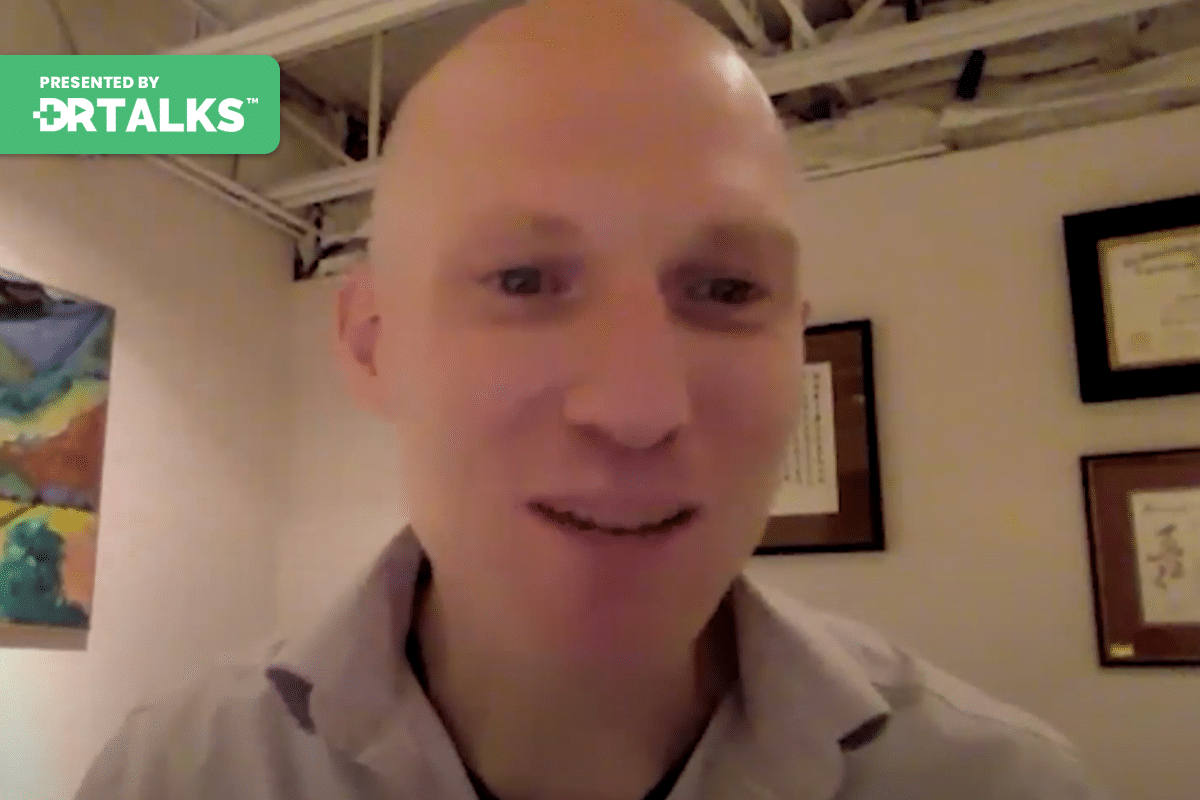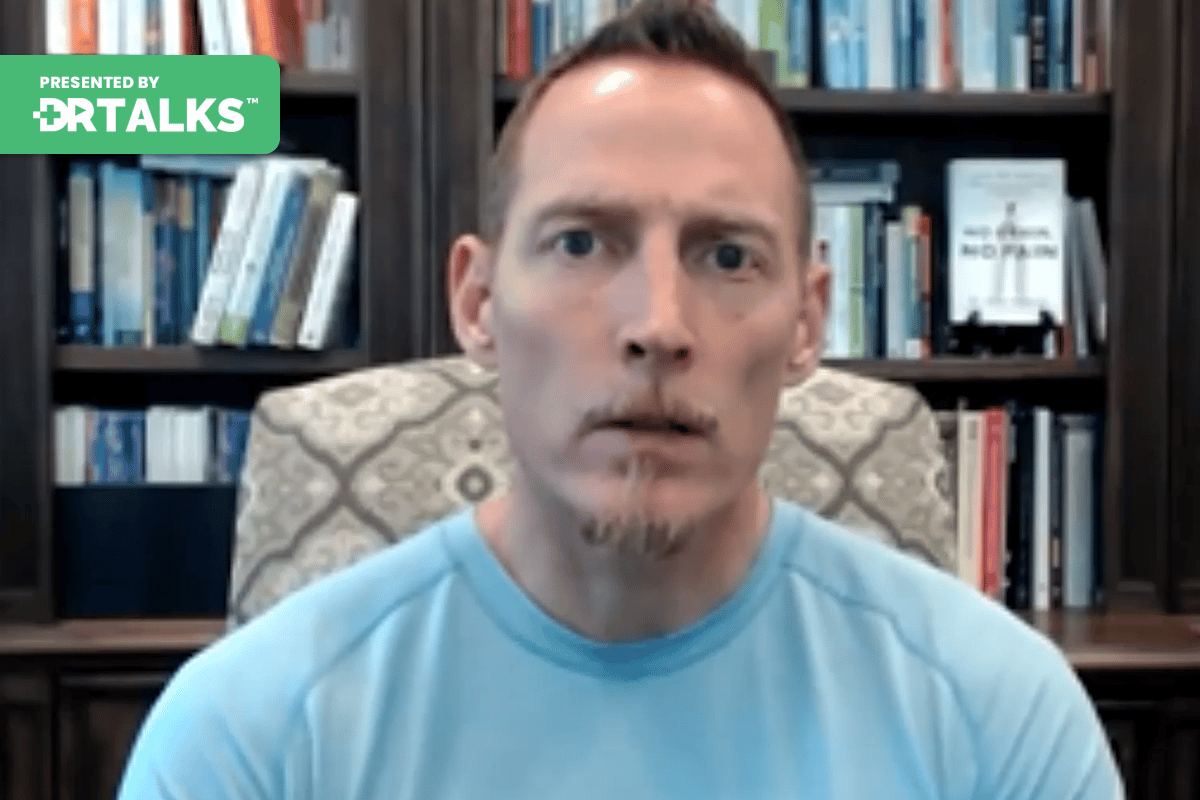Join the discussion below

Dr. Miles Nichols is a functional medicine doctor specializing in Lyme, mold illness, gut, thyroid, and autoimmunity. After Dr. Miles personally struggled with chronic fatigue in his early 20’s, Dr. Miles dedicated himself to figure out the root causes. He suffered with and recovered from thyroid dysfunction, autoimmunity, a gut... Read More

Bruce Alan Kehr, MD is the Founder and President of Potomac Psychiatry. He has been repeatedly named a Washingtonian Magazine, Bethesda Magazine and Castle Connelly “Top Doctor.,” and was awarded the "PharmaVOICE 100 Award" which salutes the trailblazers in the life sciences at the forefront of industry trends. He has... Read More
- Psychiatric and mental health conditions and the connection with infections
- How the gut, brain inflammation, and microglia activation can all contribute to mental health disorders
- Post-infection cross-reactive autoimmunity against structures in the brain as a root cause for many mental health issues
- Testing for how to assess whether infection may be playing a role in mental health and mood
- Treatment options to reduce infectious load and regulate the immune system
- Can brain autoimmunity change with treatment and if so is brain function restored and mental health improved?
- The future of cutting edge treatments and where psychiatry is going as the field evolves
Related Topics
Adrenal Glands, Adrenaline, Allergy, Antibodies, Antigens, Asthma, Astrocytes, Autoimmunity, Blood-brain Barrier, Brain Inflammation, Chemokines, Coronavirus, Cortisol, Cytokines, Dendrites, Dysbiosis, Gut Inflammation, Gut Microbiome, Immune System, Infections, Inflammatory Response, Leaky Gut Syndrome, Lyme Disease, Macrophages, Mental Health, Mental Illness, Microbes, Microbiome, Microglia, Monocytes, Myelin Sheath, Neurons, Neuropsychiatric Syndromes, Oxidative Stressors, Pandas, Psychiatric Illness, Psychosis, Sars-cov2, Sinusitis, Synapses, Systemic Inflammation, T Cells, Upper Respiratory Infections, Urinary Tract Infections, White CellsDr. Miles Nichols
Hello everyone and welcome to the microbes and Mental health Summit. I’m your host, Dr. Miles Nichols. I’m here today with Dr. Bruce Kehr. Dr. Bruce Kehr is an integrative psychiatrist and he’s the founder and president of potomac psychiatry. And Dr. Kehr has been an avid blogger as well as being interested in root cause psychiatry, autism and long covid. And Dr. Kehr is someone who’s just got an immense depth of both knowledge about and clinical experience with exactly what this summit is about, which is the connection between microbes and mental health. Welcome Dr. Kehr.
Bruce Alan Kehr, MD
Thank you. Dr. Nichols, appreciate the opportunity to be able to share this time with you and your audience.
Dr. Miles Nichols
You’re so welcome. Our title for this talk today is do infectious diseases cause psychiatric illness. And we’re going to dive deep into that before. We do tell people Dr. Kehr, how did you get interested in this work and become involved in root cause based psychiatry and in particular infections in relation to mental illness.
Bruce Alan Kehr, MD
Sure, so I don’t mind saying that mental illness runs in my family. And over the years I’ve seen family members really not properly treated to the conditions and saw firsthand that history be taken medicines we prescribe to treat symptoms and the family members really didn’t get better. And it was a deep source of pain and frustration for me. And so we began as a practice pioneering use of genetic testing About 10 years ago And probably tested about 3000 people now. And then use that testing to begin to help family members and it was a tremendous eye opener. And then we had family members who had various gut related symptoms. And it was really rather remarkable when the gut related symptoms were treated, their mental health improved. And then other family members who had Epstein Barr virus Lyme and more recently Covid and was able to observe firsthand what happened to their mental health. And so that led me on a journey that really began about a year ago to really deeply dive into literature about the role of microbes in mental illness.
Dr. Miles Nichols
That’s so important. And so glad that you’ve been investigating that. So which of the common infectious agents are known in that literature review and that research to trigger psychiatric illnesses?
Bruce Alan Kehr, MD
Well, you know, there are a number of them. And as we were talking about just before we came on the classic is Pandas right with Susan Psuedo at the N. I. M. H. Doing the pioneering research there and working with Madeline Cunningham and Cunningham panel and then that branching, it depends. Currently there are over 20 different microorganisms that have been identified as being associated with triggering creating and or causing mental illness ranging from Lyme disease to Epstein Barr virus to other herpes viruses. And of course most recently the coronavirus SARS cov2, which is really I think helped advance our field a lot in terms of interest and resources being devoted to the research of all of this. So they’re really many many different kinds of organisms that can trigger these kinds of neuropsychiatric problems.
Dr. Miles Nichols
And as you mentioned, pandas is the beginning of it, which for audience members, you don’t know. This is looking at a pediatric autoimmune acute onset, this neuropsychiatric symptom picture because of a bacteria called streptococcus or strep. And strep actually was the first one to be observed to have Children behaviorally changing dramatically post strep infection. And it’s got researchers interested in. Is there a connection and the connection was discovered? And now with pans there’s the dropping of the strep part and adding of that. Wait, a second other organisms can cause this too. It’s not just strep. And so as you mentioned, Lyme disease and Bartonella and strains of influenza and Covid and Epstein barr virus and potentially even some mycotoxin from mold and things have been starting to crop up in the picture and in the research as, oh, maybe this one too, Maybe this one. Maybe this one too. So what are some of the mechanisms can we talk about that? How is it that someone gets an infection and then all of a sudden there are these neuropsychiatric symptoms, behavior changes disorders, mental health issues that are arising as a result.
Bruce Alan Kehr, MD
That’s a great question and I prepared a few slides. So let me screen share. How’s the visibility Dr. Nichols is that good?
Dr. Miles Nichols
Yes, I can see that it’s not full screen. But I do see it in. Yeah, that’s great.
Bruce Alan Kehr, MD
All right. So this is a systems diagram that relates infections to a variety of different health and mental health conditions. So if we go down to the lower left here, we have any one of those infectious agents that can trigger systemic inflammation and then systemic inflammation can activate brain inflammation and dysbiosis and gut inflammation and can also activate the adrenal glands to release excessive amounts of adrenaline and cortisol. And these are all co activators of one another. You know, homeostasis in our bodies is based upon negative feedback loops. These are positive feedback loops that really worsen one another and then that can begin to reduce our immune system’s ability to fight off the infectious agent, change how our T cells operate begin to trigger things like asthma allergy, sinusitis, upper respiratory urinary tract infections and in some cases then lead to auto immunity. So this entire system may become co activated and the variety of different influencers that increase the vulnerability to this. Things like insulin resistance, poor diet, environmental stress hormone imbalances, sleep apnea syndrome, certain genetic vulnerabilities and so forth. And then what can happen is if we look at this by osmosis, we begin to have abnormalities of the gut microbiome down here. You can also by the way have microbes down here that don’t belong. Right.
So certain infectious diseases of the gut can trigger all of this. But if we look at that stress response and how it can create dysbiosis in the gut and leaky gut syndrome. More systemic inflammation that begins to break down the blood brain barrier and then leak into the brain, antibodies and antigens that can trigger a response in the brain. And then this is a complex slide. So I’m going to spend a little time here. What we have at the top is we have a blood vessel and here we have four different kinds of brain cells. Most people are familiar with neurons and synapses down here in the lower right. We also have microglia astrocytes and green and all of the dendrites sites in purple. So when we have an infection that enters the body and the bloodstream and the immune system triggers a response and tries to clear that infection. What happens is these vessels start to feed the brain and then these micro glia are the immune surveillance cells in the brain. And normally when things are calm, these cells peacefully coexist with our neurons and our synapses. And actually they help support new learning in the hippocampus, a region of the brain responsible for new learning. These micro glia actually help facilitate neurons and synapses to work better and create new connections and in the normal state, these astrocytes nourish and support the micro glia the neurons and synapses and the dendrites sites and in the normal state, the Zola God indra sites in the lower left, laid down myelin and repair myelin sheath, which is the insulation of the neurons.
But what happens with certain people with infections that develop post infectious neuropsychiatric problems, depression, anxiety, ptsd panic attacks and so forth is the infectious agent. Or even the information itself can begin to trigger these micro glee to become overactive. What they do is they start releasing chemicals, cytokines, chemokines, information molecules, oxidative stressors and these in turn come up to the blood brain barrier and they begin to weaken the blood brain barrier and make it permissible. And then these white cells start to come in monocytes which convert to macrophages and macrophage in french means big eater. And then what happens is these macrophages and the micro glia can literally start damaging and eating astrocytes, neurons disrupting synapses and the dendrites sites that lay down the myelin sheath actually undergo what’s called apoptosis. They actually self destruct. So this triggers a really significant inflammatory response in the brain which then disrupts these neurons and synapses which can lead to all different kinds of neuropsychiatric syndromes, including even psychosis.
Dr. Miles Nichols
That’s amazing that there’s such a strong connection. And you mentioned the gut playing a role. You also mentioned that there are infections playing a role. You mentioned, there can be permeability in the intestines as well as permeability in the blood brain barrier. And there can be this excessive activation of micro glia and all of this can relate to this immune imbalance with the th one th two and play a role in this bigger picture. You mentioned, the asthma and allergy side of the immune systems is something close to my heart because I had allergies and asthma as a young child. I didn’t know why, I didn’t understand that this might be part of the picture. Then I had recurrent strep throat over and over and over again. That was usually a weird strain. That was hard to identify. And and and these things I didn’t think anything of. Even my father who was a doctor, a very highly educated doctor didn’t think that much of. Is this potentially setting the stage for bigger long term problems in the brain? So tell a little more about when someone is undergoing these infections. Is it just one infection and all of a sudden this happens? Or is this a build up from multiple infections over a period of time? What role does the gut play? Can we get a bigger picture on this in that way?
Bruce Alan Kehr, MD
That’s a really great question. So it sort of can be any and all of the above. So we’ve seen for example, let’s just take one infection, coronavirus. We’ve seen patients now with acute onset psychosis who never had psychosis before as a result of coronavirus, We’ve seen acute onset of anxiety and depression. We’ve seen in long haulers, you know, by definition have had their symptoms greater than 12 weeks. We’ve seen them have persisting brain fog, mood symptoms, anxiety and so forth. And you raise an interesting question about the gut. Well the gut, understandably given evolutionary necessity is a huge repository of the immune system. In fact About 70% of our immune system resides in the gut And about 75% of cells in the gut have immune system functioning. And so you know we could speculate well maybe people with long Covid have had gut related issues before they came down with Covid. Maybe there was inflammation down there or dysbiosis or insufficient digestion or insufficient production of short chain fatty acids. Or maybe even leaky gut syndrome.
And that could have predisposed to the onset and maintenance of long covid or even a worsening covid infection in the first place. And there is this interplay and inter reaction. So then if we take it a little further to answer your question what we’ve seen happening. In fact I was treating a young woman earlier today. She’s a college student nearby and she had some anxiety, some depression before Covid and really a top student really smart but following Covid she’s really deteriorated and she’s developed severe O. C. D. Symptoms severe anxiety and depression. And we did a blood study on her and we found activation of anybody’s huge levels of anybody’s to prior infections like Michael plasma. Like some of the herpes viruses like Epstein Barr virus. So we have this issue where we’re having immune system dysregulation and activation of these other viruses that you know we all carry around inside of us, right? We’ve all been exposed to them but in her case and in other cases they become reactivated and they’re not really held in check. So I I realize that’s a long answer but it’s sort of all of the above. Right?
Dr. Miles Nichols
Yeah. And when we’re talking about this mechanism here and we’re going into how this occurs, we’re really talking about this post infectious autoimmune process. So there’s an inflammatory component, there’s this immune attack against self component to it. So where does that play in when we have this micro glial activation we have this inflammation, we have these pathogens causing the microfiche Asia’s to the macrophages to go into the brain. Where is the autoimmune aspect? How do we simply understand the tissues or structures that are being attacked and can that be tested for and measured?
Bruce Alan Kehr, MD
Well this is a slide from a friend and colleague Dr. Craig Shimazaki who works with Dr. Madeleine Cunningham who madeleine created the Cunningham panel and Craig is a PhD M. B. A who runs molecular labs that produces the Cunningham panel and what Craig likes to talk about is a phenomenon called molecular mimicry which is illustrated here. So what happens is from left to right a microbe enters the body and the immune system rightly recognizes that microbe and begins to attack it. If not the innate immune system then the adaptive immune system which comes to recognize it and then be able to produce antibodies from B cells and killer T cells to kill it off. What happens in some people and the reasons aren’t completely understood yet. It possibly is genetic vulnerability and what’s called H. L. A. Regions of the chromosome or MHC regions of the chromosome, there’s certain genetic vulnerabilities. Some of these patients have autoimmune diseases that run in their families. What happens is the immune system begins to fail to recognize not self in this case the microbe from self in this case the brain cells. So the reason for that is on the surface of let’s take let’s take coronavirus because that’s been really well elucidated recently.
They have now been identified on the surface of the coronavirus itself Over 30 different regions of amino acid sequences on the surface of the coronavirus that are identical to amino acid sequences on the surface of brain cells. And we’ve now identified over 20 antibodies that can attack both the coronavirus as well as neurons because these amino acid sequences are identical. So immune system gets confused and attacks the pathogen, it attacks the central nervous system. And then what happens is those antibodies being into disrupt cells circuits and systems in the brain. So earlier in that earlier side we just shared. We have brain inflammation. But now we’re actually having antibodies that are attacking brain tissue directly and what the Cunningham panel does is it measures four different types of antibodies to brain tissue and also it has 1/5 test that looks at activation of an enzyme called CAM kinase two which when activated can also produce and aggravate neuropsychiatric symptoms. So we see here a lot of the different kinds of symptoms that can develop as a result of these antibodies let’s call them anti brain anti bodies.
Dr. Miles Nichols
That’s so important. And one of the ways that I like to think about this or help explain it to people that’s so simple to understand is that it imagine that the police department gets a picture of someone to go after and it just so happens that an innocent person looks a lot like that picture. That’s kind of a bit of what’s happening, where we see that the protein structures the amino acid structures on the surface of certain microbes might look a lot like a dopamine receptor in the brain. And so attacking the immune system attacking that infection and trying to deal with that infectious load is inadvertently also attacking something like the dopamine receptors in the brain that then can cause changes in the neurochemistry of the brain that can then lead to changes in mood changing drive changes motivation and sometimes the diagnosis of mental illness. What would you add to that simplistic version of the understanding?
Bruce Alan Kehr, MD
That was very elegant, very elegant presentation of it. Since all of these cells operate in circuits and systems, the circuits and systems get disrupted and it really is quite disturbing. And if we just treat this with let’s say psychotherapy and psychiatric medications alone, we’re really not fully treating the condition. And I have enormous respect. I’m a psychiatrist, I have enormous respect for psychotherapy. I trained in psychoanalysis have been in psychoanalysis. And I have enormous respect for psychopharmacology as well. But the challenge here is those two interventions alone are not enough to really enable a complete recovery in patients and whether it’s pandas or pans or post Epstein barr virus or were talking earlier before today you and me about the different tick borne pathogens that can trigger these kind of syndromes. What we need to do is as diagnosed diagnosticians and healers. We need to also do these other kinds of tests that can help us delineate what else is going on immunologically that can then influence neuropsychiatric symptoms.
So for example Dr. Bruce Patterson who came out of Stanford to form in cell D. X. They’ve created a panel called the in Selkin Panel. It’s 14 cytokines and chemokines and they’re using that test combined with artificial intelligence to basically segment the cytokines and chemokines into groupings and then tailor specific medication interventions to specific groupings and so some of their work has resulted in in in long covid combining Morava rock which was is repurposed from HIV patient treatment plus pravastatin which lowers cholesterol to help some long covid patients. And so there are other tests you know for example vibrant America as a tick borne disease test that looks at many many different tick borne microorganisms. I think the key takeaway is we really need to go deeper to look at the underlying root cause drivers of inflammation. Looking for those infectious agents. Looking to see do we have active infection or reactivating something dormant to really fully serve the diagnostic process and to properly target the treatments.
Dr. Miles Nichols
So someone who’s struggling with depression or anxiety or PTSD or O. C. D. Or an eating disorder who may not understand any of these connections may be starting to wonder could there have been an infection and could that infection then have led to something like this auto immune process or this inflammatory process that has led to a disruption in the brain’s ability to regulate mood. And this might be really actually relieving for some to hear that there might be some cause or causes that have been not assessed for or diagnosed at this point in their care process. So in relation to those people who may be struggling with mental illness or a family member or a friend might be struggling with depression with anxiety with other neuropsychiatric symptoms? How often and in which cases do you recommend that people pursue looking at testing related to infectious causes and or antibodies against brain tissue.
Bruce Alan Kehr, MD
That’s a great question. I would say it begins with the history, and what I encourage patients to do is go back and ask family members to help with this because you may not remember that mono infection or you may not remember that. You know, you went camping out in the woods and, you know, you had a bite with, with a bullseye rash or you had maybe as a child, a parent removed a tick from your scalp, but you may not remember these things. And I think that’s a critical piece where it starts to get complicated. Is the onset of the psychiatric symptoms may not be immediate? You know, it’s reported by Dr. Nichols in literature, sometimes days, weeks, months can elapse some people even think maybe even a few years before the infection induced trigger can be manifested as you know, the cause or at least a contributor to the ongoing neuropsychiatric illness.
There may come a point, you know, and we’re all we’re all learning as we go with all this. Right? There’s this phrase now with long covid were flying the plane while we’re building the plane. Right? So it very much should be a collaborative effort between the doctor and the patient to really dig in and really look at that history and develop a timeline and see if this is an issue. I think the other way that can really help, is there various screening instruments that can be used their questionnaires, simple questionnaires, there’s he variety of different autoimmune disease screening questionnaires that the clinician can ask. There’s the Horowitz lyme screening questionnaire that clinicians can ask. So even if there isn’t a clear history of an infectious agent being involved, these screening questionnaires can help you become more suspicious that, okay, maybe we do have an infectious cause here and let’s do some of these tests, at least. That’s the way we tend to think about it.
Dr. Miles Nichols
I really appreciate that because I also, I utilize the Horowitz questionnaire and I do talk to people about their history in a way that sometimes is a little different in that there isn’t always a as you mentioned, direct infection leads to sudden change. It can be delayed and there isn’t always even the realization that infection has happened. The most recent paper that came out about prevalence rates for zero positive Lyme for lyme positive and blood tests on 14.5% of the world population zero positive for Lyme. And that’s something that one in seven, it’s about approximately is the stat there. And that’s something that a lot of people don’t recognize or think about. That one in seven people are potentially walking around with an infection from Lyme disease. And when you look at things like covid things like influenza things like Epstein Barr, that it’s rare to find a person who hasn’t been infected with Epstein Barr virus at some point in their life that this starts to paint a picture that to me if I don’t see a clear emotional traumatic cause for the onset of mental illness. If someone was generally doing pretty well in their life and then they started to have a more significant sense of this type of anxiety or this type of depression or this type of dis regulation in what they knew their personality to be before.
If they don’t feel like the same kind of person and if there wasn’t some significant emotional traumatic event that was an instigator or trigger to that, then we could be looking at an infectious trigger. And even if there is an emotional trigger there could be an infectious backbone that together with the emotional trigger may push the Alice static load over the edge for a person and that these should be looked at in tandem with each other through as you’re mentioning both good case history together with questionnaires and potentially also some of these diagnostic lab tests that we’ve been mentioning as well. So if someone does come in, let’s say to your psychiatry practice and they want to get evaluated for these infection induced causes for mental illness which are the couple of the top tests that you’re sure to make sure to do to work up the possible causes that might be relevant to them.
Bruce Alan Kehr, MD
I would say at a baseline. We run laboratory tests through either Labcorp request and they screen for a lot of these antibodies that we’ve been talking about today. We also will do a test like vibrant America got Zuma test or a Genova G. I. Effects test because we really want to understand what’s going on down in my gut because if there’s let’s say dysbiosis cor inflammation or insufficient short chain fatty acids or their findings down there, we have reason to believe that the immune system is not working well to start. And with leaky God, you know if we’re leaking bacteria, bacterial fragments and completely digested foods into the bloodstream that in of itself can cause a lot of these symptoms. And also that test can help see is there a pathogen, is there something some micro re bug down there that shouldn’t be there? So that would be a pretty important baseline test for us. And then in terms of looking further we really make a good use out of the Cunningham panel because that’s going to look for anti brain anti buddies and the treatments that come out of that. I should have a slide on that here. So this brings up a whole host of other treatments, let’s say one or more of the Cunningham panel domains is elevated. We get into…
Dr. Miles Nichols
An elevated just for the audience is gonna mean that there is the immune system attack against one or more structures in the brain. So there’s this cross reactive auto immunity that we know often to have this infectious through cost.
Bruce Alan Kehr, MD
Thanks for that. Sorry. Get a little carried away and get a little ahead of myself. Thanks for that. So let’s say we have someone who is in therapy and they’re on an antidepressant or anti anxiety medicine. They’re partially better or they’re not getting better. And we have Cunningham panel with these positive results. It brings in various kinds of immune system modulating treatment. So if we have active infection even in the gut, if we have active infection, there’s certain herbal antimicrobials that can be used if we don’t think we have active infection and they’re also antivirals, certain anti inflammatories might be used for short periods of time. Plasma exchange not so much in these days because we need high levels of antibodies to fight off coronavirus I V I G I V. Right talks a mob.
These are some of the medicines that can really help patients with these anti brain anti bodies. And then the other test that we look at is the insult kind, which I think is going to a broader application beyond covid. I apologize. This slide is a little dark. It’s from one of Dr. Bruce Patterson’s presentation. So Here we have the 14th cytokines and chemokines that are tested by the in cell Kym panel. You can begin to see some of the artificial intelligence at work here around segmenting out, you know what medicines over here on the right can be useful based upon what is the pattern of cytokines and chemokines that are present. So, these are two tests we’re using more and more of not just in, you know, coronavirus world but also for some of our other treatment resistant patients.
Dr. Miles Nichols
This is fantastic. So, when it comes to treatment that what’s interesting is that you’re mentioning that these antibodies to brain tissue which are triggered by this cross reactive auto immunity from infections. The infection happens, the immune system attacks the infection but also is attacking brain structure, which looks a lot like the infection that sometimes the level of that infection, if even some of it might become chronic, that infection becoming chronic as in the case of Lyme disease many times can become chronic then lowering that infectious load may calm in part that immune response down. Is that true? That the auto antibodies are if they’re triggered, ongoingly by infection might be higher and reducing that infectious load would lower them. And are there other cases in which the antibodies may stay elevated even after an infection completely resolves?
Bruce Alan Kehr, MD
Great question again. So molecular era has a series of patients now that they’ve been studying sequentially with repeat Cunningham panels over time and among the patients that recover and they beautifully heatmap this they’ve got all the research on their their website that show this with the heat mapping the patients that recover regardless of the reasons for the recovery, it could be, as you’re suggesting anti infective, it could be anti infective is followed by immune modulating agents. It could be immune modulating agents alone. But what they show is the cytokines return to normal. They’ve got really compelling data around that and they show that the symptoms improve. The depression is less, the anxiety is less than the PTSD is less, or even the psychosis is less. And along with that improvement in symptomatology and in the symptom severity and symptom patterns they show a reduction in the cytokine. So it’s a huge validator for the value of the Cunningham panel and be able to diagnose and help treat patients.
Dr. Miles Nichols
So to confirm the antibody levels are decreasing as people are taking antimicrobials and immuno regulating substances that are assisting the immune system in balancing out those therapies, some of which you mentioned on the previous slide are reducing the antibodies helping to resolve symptoms and people are having that change lasting over time.
Bruce Alan Kehr, MD
Yes. And I would just add to that that there are other immune modulating treatments within psychiatry itself. So for example, CBT therapy, reducing the stress response helps the immune system. Many psychiatric medications have immune system modulating effects. For example, a medicine you might use in your practice pregabalin Lyrica has immune system modulating effects. An antidepressant Trent Alex for the oxytocin has immune system modulating effects. So there is this if you will a kind of multifactorial approach to these complex conditions that can involve all of the above that can then serve to reduce these antibodies. These anti brain antibody levels improve symptoms, improve quality of life.
Dr. Miles Nichols
This is giving, I think some hope to people who may be struggling that it beyond any kinds of other interventions. There may be something to identifying infection as a cause and utilizing anti infectious and immune regulatory treatment modalities in order to reduce the immune system attack against actual structural tissues in the brain. And that reduction in the attack is associated with improvement and symptoms and maintenance of that improvement in the symptom Atala ji reduction and depression, reduction in anxiety, reduction in whatever the neuropsychiatric expression maybe in their case. And that is something that I think that people can take the heart is that there is some hope in utilizing testing and treatments in this kind of a way in order to actually get results. I know a concern that some people have around when discussing something like the immune system attacking structures in the brain. Some people might be wondering, well, what if it was going on a long time, what if the damage already has been done? If those antibodies go down, will I still improve in my symptoms?
Bruce Alan Kehr, MD
Well, you know, the brain has a lot of what we call neural plasticity and what we mean by that is, for example in the hippocampus where new learning takes place and where a certain level of emotional regulation takes place, We can grow 700 and 900 new brain cells a day and the brain is continuously being able to form new connections between existing brain cells. So there’s a lot of plasticity in the brain. And so I think people should feel hopeful that even with these chronic conditions they can be improved upon. Are we at a point today where we can say, well do all this and you’re cured, we’re not there to be, you know, completely candid, we’re not there, We can certainly do a lot to improve symptom Atala ji improve quality of life, improved functioning. But there is significant capacity to reduce brain inflammation, brain autoantibodies. And I think gut healing plays a role in that if there’s evidence of dysbiosis gut inflammation, gut syndrome, so it all can really work together to improve one’s sense of self one’s self esteem, one’s functioning with this kind of integrated approach.
Dr. Miles Nichols
That’s so wonderful and so good to hear. And also even there is research when looking at gray matter in the brain and M. R. I. Imaging fmRI imaging of looking at gray matter in the brain and seeing certain even practices like meditation practices increasing gray matter density in the brain or certain kinds of there’s a peptide that was shown to restore some gray matter area where damage had occurred from certain toxins or infections. And so there’s also this capacity for actual structural growth in the gray matter of the brain and as you mentioned this tremendous ability for neural plasticity and rewiring of these pathways, these neurological pathways in the brain. And and then there’s the whole world of many other practices, substances and things that people can engage with related to neural plasticity. So we are seeing some breath work practices and certain other things that are starting to gain some research. So I think there’s also future hope for even without full resolution, even without the ability to say we’re able necessarily to cure some of these mental illnesses completely that reduction in inflammation, that restoration of function that lowering of the antibodies against brain tissue. The improvements and gut function are a lot already. And I think there are innovations and research that’s up and coming that might even be able to take it further as we develop those innovations any on the horizon, innovations that you’re excited about that you feel might be promising for the future. Even if not fully researched at this point.
Bruce Alan Kehr, MD
There’s one that has it’s something we use today. It’s continuously improving. It’s a brilliant tool. It’s called Intel X D N A and I N T E L L X X D N A. And it was co created by two women founders. Dr. Sharon Houseman Cohen one of the founders, chief medical officer. She’s dual board certified trained at Harvard And Carol Bilic is her partner in this and what Intel X. D. N. A. offers I think is really rather remarkable. It tests over 700 different genetic variations and then provides the doctor what’s called a decision support tool. Whereas the genes are better understood as their mechanisms of action are better understood and as the modulators of those genes are better understood. You know what can we use to turn a gene off or turn it on. That decision support tool really helps really refine this process. It’s not something we’re using right out of the gates it’s more a bit later stage. But the really neat thing about that tool is most of the interventions are based in micronutrients and supplements and the data is really quite compelling and they’re fully transparent about the research that supports the recommendations in the tool. And the other thing I find really exciting about it is while your D. N. A. Doesn’t change. The science is advancing when how to modulate your genes how to turn certain ones on certain certain certain others off. And this is something an intel X. D. N. A. Is continually sifting and sorting through the research to help us practitioners better modulate that gene expression. So you could think of it like this really wonderful epigenetic tool to help really fine tune a lot of what we’re talking about today.
Dr. Miles Nichols
Fantastic. That’s a really great resource and micro nutrients and nutrient imbalances and nutrient maximization or optimization is really incredible. I found that in my practice to to where it’s not just about the because of the R. D. A. S. And the adequate intakes the recommended daily allowances that have been defined around nutrients are really defined around preventing clinical deficiencies and very significant symptom expression. They’re not identifying what is the optimal intake for peak neurological function or what is the optimal intake for maximal immune system regulation or optimal college information and repair in the body. So these kinds of things are largely under researched and under explored. But the research is beginning to come in and we’re starting to understand genetic predispositions that might require higher amounts of some nutrients and many other aspects of how nutrients can impact brain function, gut function, immune function. So I do agree with you there that this is an up and coming aspect in terms of what might be able to be targeted for increasing the outcomes beyond simply also looking at the gut and infections and some of the things we’ve been discussing here, you mentioned plasmapheresis as well and that that has this tremendous capacity from regulation and reducing cytokines. But you kind of alluded to a concern around antibodies. Can you just speak briefly to that this is not my field?
Bruce Alan Kehr, MD
I’m not an immunologist but in talking to immunologists they’ve been reluctant to use plasmapheresis because they worry about you know by taking away anti coronavirus antibodies that you know the person needs to fight off coronavirus. But I think, you know, certainly I v I G. Is still in widespread use I ve riTUXimab, which is a monoclonal antibody. We’ve seen some pretty dramatic results with some of our patients with both of those and then alone or in combination with what in Selkin is recommending as we see here in this slide based upon the cytokine and chemokine patterns. All of that is still very useful even in a coronavirus world. And I don’t think from again, I’m not an immunologist, I don’t know that plasmapheresis would add a whole lot to any of that right now.
Dr. Miles Nichols
Thank you for sharing that. So will you give a bit of a summary, a review a recap on what we’ve discussed? We’ve really talked about so much territory here in relation to psychiatric conditions and the causes that might underlie them. So I’m curious if you give a short recap on summary on what we’ve discussed the testing for the underlying causes and some of the treatment options.
Bruce Alan Kehr, MD
Sure. I think first and foremost when a patient has these sorts of problems, they feel broken and sometimes they feel very lonely and alone. They’ve been dismissed by various doctors as it’s oh it’s psychological or family members, it’s all in your head or you know you’ve got a great life. What’s wrong with you? Why don’t you just get over this and I think it’s important to recognize that what all this means is it’s a sickness. It’s like any other sickness. It’s not something that someone would choose to have. It’s something that has befallen them. And we like to say, you know, health is D. N. A. Plus environment plus triggers, plus chance, that determines how we feel and how we function. If a trigger is an infection you can’t control for that, it’s a chance happening. And so to summarize all this, what I would say is if you’ve been suffering from psychiatric illness and you haven’t recovered to your old self or you partially recovered but not fully recovered and or you haven’t recovered much at all, really search long and hard for whether there’s an infectious disease in your past. Ask family, ask friends, go back to your primary care doctor, go back to your pediatrician if they still have the records and try to discern, is there, are there one or more infections in your past and then?
Did the symptoms of depression or anxiety or other psychiatric symptoms follow days or weeks or months later? And to your earlier point Dr. Nichols, thank you for making that distinction earlier. Perhaps it wasn’t in the context of a major loss in your life for a major setback. The symptoms sort of came on where you’re outside environment was really relatively stable. That’s another thanks again for making that point. That’s another perhaps way of wondering, is there an infectious disease at play? And then I would go into your psychotherapist, your psychiatrist and really advocate for yourself on your own behalf. Can we look more deeply at this? I really want to work with a functional integrative medicine doctor, like a Dr. Nichols who can, you know, look at this with me and there are many functional Integrative medicine doctors around the country have an open mind, All those who will not dismiss your concerns and if your psychiatrist won’t accept or embrace that, there may be something here, fire them. They’re not the right choice for you. Find someone who maybe doesn’t know a lot about this, but who’s open to thinking of it? Because there’s a huge paradigm shift coming in psychiatry, a huge paradigm shift around genetics, around the role of the microbiome, the role of cellular health, the role of systemic and brain inflammation, and the role of infectious diseases and auto antibodies against the brain that is coming. It’s going to happen. And if your psychiatrist or other practitioners won’t be open to that find someone else.
Dr. Miles Nichols
Well, Dr. Kehr, this is amazing. This is a great resource and tool and I can feel the level of care and support of helping people to feel some hope, helping people to feel inspired that they may not have the full picture and that there are resources and options available. Were not at the point yet to say yes, we can cure all mental illness but there’s a lot that many people haven’t touched on. Many people haven’t gotten the diagnostic tools and treatments that are available right now, at least in the integrative and functional space. And as you mentioned, that will be coming in the future of the psychiatric space as well. So thank you for that. I know people are going to want to find out more. I know you have a great blog that’s full of information and some people may want to find out more about your practice as well. Where can people go to learn more about you and your writings and the information you’re putting out into the world?
Bruce Alan Kehr, MD
We have a website, potomacpsychiatry.com Potomac like the river, Potomac river in Washington D. C. Which is where many of us are based. And the website has a very powerful search engine. It’s just as fast as google. We have probably virtue of 300 blogs that cover a lot of what we talked about this evening And then our practice actually operates in all 50 states as consultants. What we’ve done is we partner with the patient and their local practitioner And we can do this entire work up, present our findings, present a treatment plan and then work with the patients and their local practitioner to implement the changes and then depending upon what’s needed, we can have periodic follow up meetings where we get together and we review what’s going well and what isn’t. And so that’s a model that we now have been using in all 50 states.
Dr. Miles Nichols
That is fantastic and adds to the accessibility and availability for people. And please do check out the website, the resources, the freely available information, the blogs there. And if you’re feeling called to get more help, then the clinic is a great way to do that. Thank you so much Doctor Care for joining for this informative conversation. And thank you everyone for watching. This has been another episode of the Microbes and Mental Health Summit. I’m your host, Dr. Miles.
Downloads










